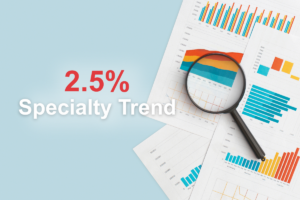The global pandemic we are currently living in, also known as “the COVID-19 era,” will have long-lasting effects on most aspects of our daily lives. Temperature checks at restaurants, empty baseball stadiums and the lack of middle seats on an airplane are just some of the changes you can expect to see in the near future. Another major change will be the effect on the pharmacy services industry.
Having appropriate access and practicing adherence to prescription drugs can often reduce costs on the medical side. It should not be surprising to see higher numbers in pharmacy spend in the beginning of 2020, because it means people have an adequate supply of medications and are less likely to lose control of the conditions being treated. Additionally, benefit plans need to be prepared to spend more on mental health drugs and services to reduce the impact those conditions will have on their total medical spend.
Demand for Care
Some demand for care will not continue throughout this pandemic — instances like sprained ankles or mild stomach bugs that people can treat at home. This represents cost savings.
Other demand is pent-up and will continue until it’s fulfilled, like elective surgeries and outpatient visits. These are simply delayed costs and may end up being more costly if the condition worsens. For example, the incidence of heart attacks and strokes has dropped significantly on a global level since the beginning of the pandemic.1 This may mean people with symptoms are not seeking appropriate care out of fear of infection and may end up with a more serious condition later. The pharmaceutical side is seeing fewer new starts to treatment for some chronic conditions, so that may spike as in-person office visits return.
Mental Health Services
Mental health is equally as important as physical health and should be treated as essential care, to reduce cases of post-traumatic stress disorder and minimize worsening of other mental health disorders. It is vital that people refill their prescriptions and practice self-care during the pandemic. It is also essential to ensure people who are at risk of relapse for addiction are connected to support systems and resources, which will prevent the need for inpatient stays and rescue treatments.
How Employers Can Mitigate Costs
Pharmacy benefit managers’ actions to minimize prescription refill gaps will result in higher than usual spend for the beginning of 2020. However, as people use up their early refills and extra supplies of medication, we will start to see things even out. The proportion of refills for 90-day supplies increased at the beginning of the pandemic and is expected to remain elevated after it ends. The best thing employers can do right now to lessen additional COVID-19-related medical and pharmacy costs is to ensure and encourage access/coverage to virtual care so those with chronic disease and mental health conditions do not end up in health crises. Employers should educate their employees of the benefits available to them such as free delivery by CVS Caremark and 90-day supplies (if the plan allows) and advise them on when to seek “in-person” emergency or urgent care.2
What We Are Doing to Help
National CooperativeRx and CVS Caremark have worked to ensure continuity of pharmaceutical care and reduce the risk of gaps in prescription refills:
- Existing prior authorizations have been extended to accommodate delays in follow-up office visits.
- Early refills have been allowed and delivery fees waived to improve access to medications and reduce unnecessary trips to the pharmacy.
- Quantity limits have been placed on certain medications, like albuterol inhalers and hydroxychloroquine, to ease strain on the drug supply chain by preventing stockpiling.
If you are a National CooperativeRx member and have any questions or concerns about your benefit plan during this uncertain time, please contact your account manager.
- Garcia S, Albaghdadi MS, Meraj PM, et al. Reduction in ST-segment elevation cardiac catheterization laboratory activations in the United States during COVID-19 pandemic. J Am Coll Cardiol 2020; accessed May 5, 2020 at http://www.onlinejacc.org/content/accj/early/2020/04/07/j.jacc.2020.04.011.full.pdf
- CVS COVID-19 Toolkit




